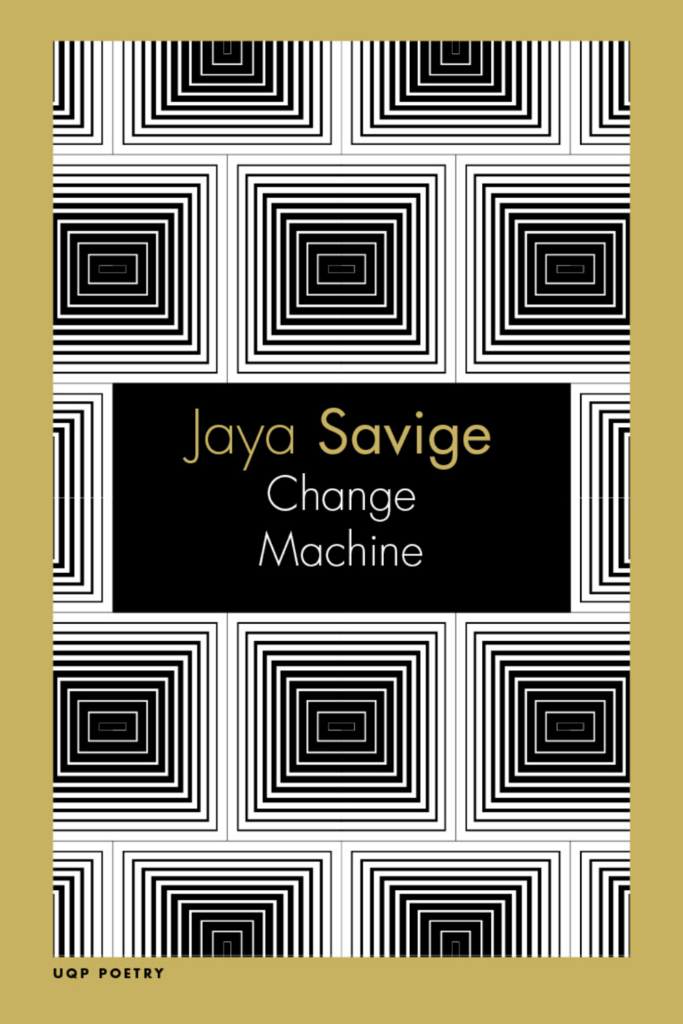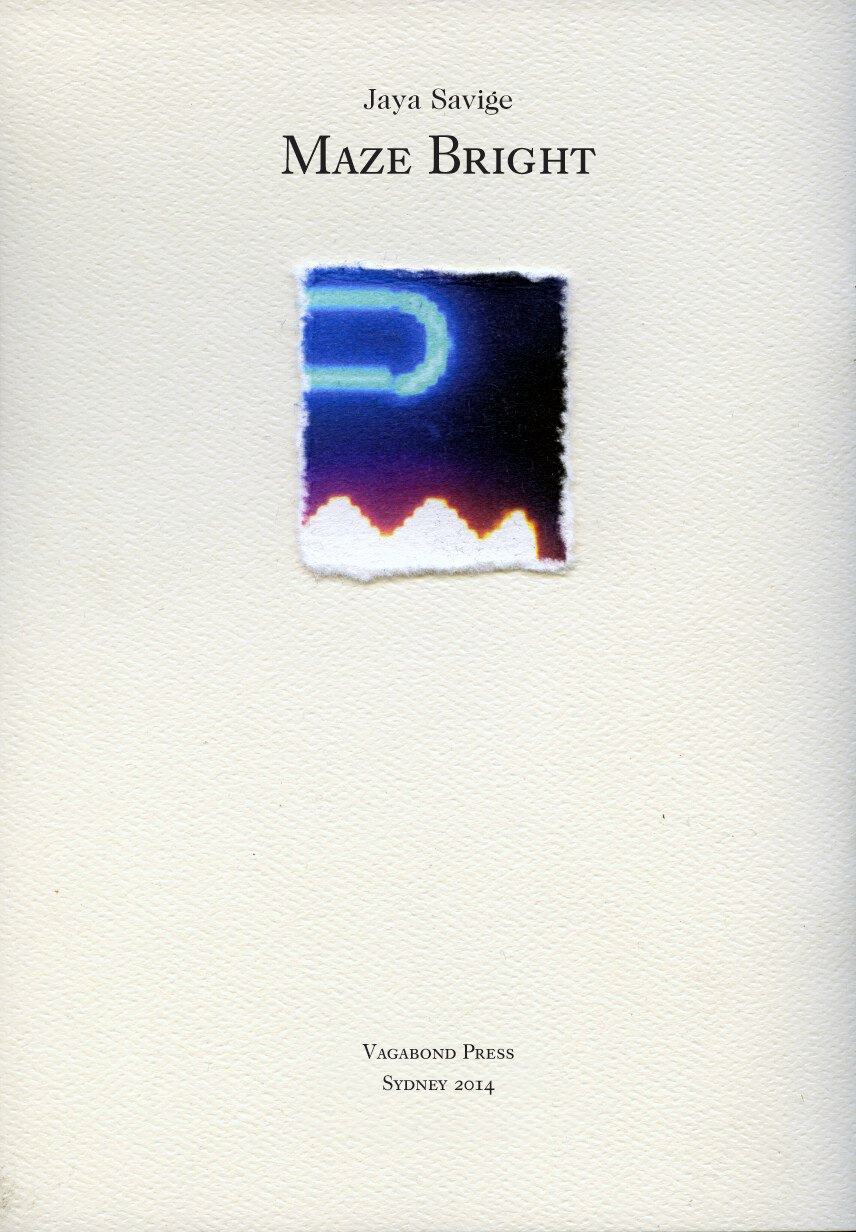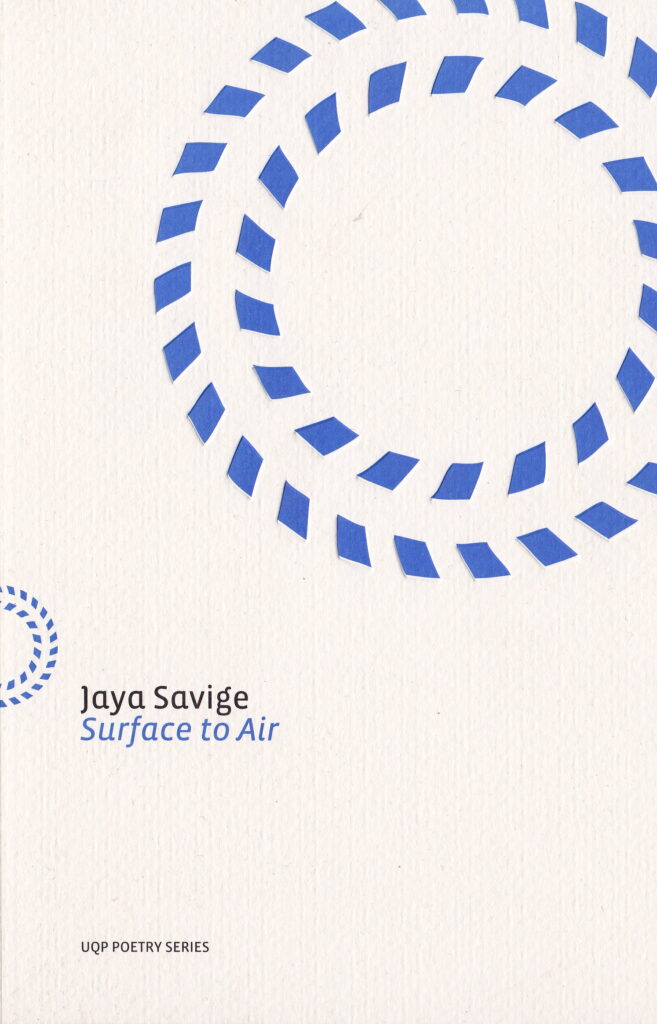BOOKS
Change Machine
2020, University of Queensland Press

✩ Shortlisted for the 2021 ✩
Prime Minister’s Literary Award for Poetry,
NSW Premier’s Kenneth Slessor Prize,
QLA Judith Wright Calanthe Prize,
& the Queensland Premier’s Award for a work of State Significance
📚 Book of the Year 2020 📚
Sydney Morning Herald,
Australian Book Review,
The Australian &
ABC Radio National’s Bookshelf
PUBLISHER’S DESCRIPTION
Tough and alert, Savige’s shapeshifting poems reflect the world in violent transformation. Bodies scarred by history collide in the ruckus of generations, geopolitics and technology. Elegies appear alongside poems that set a pulse to new life, biometric surveillance, leaf blowers, fatbergs, mechanical pets and military coups. A work of fiercely intelligent artistry, Change Machine is shaped, equally, by feeling – its wild originality comes from how it forces the two together.
✩ PRAISE for Change Machine ✩
‘I found myself frequently cursing under my breath and sometimes out loud at the absolute harmony between formal virtuosity and emotional gut-punch, ambition of concept and conviction of execution. Savige’s poetry is deeply funny and moving and outward-looking in every stanza. Change Machine is an important collection and one I know I’ll be re-reading for years to come.’
LUKE KENNARD, author of Notes on the Sonnets
‘There are some books that need years in the making to become what they are, and Change Machine is one of them. It is one of the finest volumes of innovative poetry to come out of Australia in two decades. It tunes and detunes; it gives new locutions to experiencing the static and detritus of late modernity; it reinvents wheels within wheels to upset conversations between centres and peripheries. A work of genius in the humanistic sense, but also in the sense of ‘begetting’ – Savige makes new with every poem.’
JOHN KINSELLA, author of Spirals, Collected Poems Volume Three (2014-2023)

‘What sets Change Machine apart is the exquisite marriage of feeling to linguistic ambition and an exuberant gift for verbal generation. This combination is rarely distilled to such proof.’
Judith Bishop
— Australian Book Review —

‘After years of anticipation, I was thrilled to finally read Jaya Savige’s dazzling third volume, Change Machine: an intoxicatingly inventive and erudite collection … that ricochets from Westminster to Los Angeles to Marrakesh … Yet for all the book’s global sweep, it’s the quiet poems about fatherhood that stay with me.’
Sarah Holland-Batt
— Australian Book Review —
Books of the Year 2020

Q. Do You Have A favourite Australian poetry collection?
‘It often changes, but one recently published book I keep returning to out of a deeply felt sense of admiration and astonishment is Jaya Savige’s Change Machine.’
DAN DISNEY
— Australian Book Review —
May 2023

‘Witty, urbane, possessed by playfulness,
this is a book of slippages and switcheroos, as allusive as Ulysses …
Time and again, the poet’s alertness to sound acts as a vigil on behalf of the disappearing … Savige testifies to the fact that artistic creation is inextricable from creation itself.’
DANIELLE CHAPMAN
— Orion Magazine —

‘Jaya Savige with Change Machine (UQP) has transferred his visions to the page with a virtuoso’s skill.’
Robert ADAMSON
— Sydney Morning Herald / The Age —
Books of the Year 2020
△ REVIEWS of Change Machine △
- Bishop, Judith. ‘Lost in the funhouse: An exceptional third collection’, Australian Book Review, 425 (Oct 2020), pp. 55-56. Web.
- Chapman, Danielle. ‘The Big Poetry List: 28 Recommended Collections for National Poetry Month’, Orion Magazine, May 2022, Web.
- Duwell, Martin, ‘Review of Change Machine’, Australian Poetry Review (Nov 2020). Web.
- Holland-Batt, Sarah. ‘Unlocking the Savige machine’, The Weekend Australian (October 17-18, 2020), Review, p. 18. [Appears in: Sarah Holland-Batt, ‘The Anagram: On Jaya Savige’ in Fishing for Lightning (UQP 2021), 162-67.]
- Masters, J. C., ‘Review of Change Machine’, Mascara Literary Review (December 20, 2020). Web.
- Page, Geoff. ‘Poetic high points from another expat in the UK’, Canberra Times / The Border Mail (12 Sep 2020), Panorama, p. 41. Web.
- Romei, Stephen. ‘A Pair of Ragged Claws’, Weekend Australian (21 Aug 2020), Review, p. 15.
- Varatharajan, Prithvi. ‘Syntactical Torque’, Rev. of Change Machine, Sydney Review of Books, October 2021. Web.
Maze Bright
2014, Sydney & Tokyo: Vagabond Press,
Rare Object Series No. 99

Behavioural psychologists and developmental biologists working in the nascent field of epigenetics in the 1940s coined the term ‘maze-bright’ to describe laboratory rats displaying a marked proficiency in maze navigation. Since then, the term has been deployed across a range of contexts, most notably in HR parlance to describe ‘attractive hires’.
Maze Bright seizes on the semantic pluripotency of its titular motif, transposing it into the early twenty-first century cultural keys of gaming (‘パックマン [Pacman] Étude”), cinema (‘Magic Hour, LA’, ‘Cinemetabolic’), finance and insurance (‘To His Coy Investor’, ‘Act of God’), extreme sports (‘Wingsuit Journal’), psychogeography (‘Citicity’), postcolonial deracination (‘Nick Cave at Buckingham Palace’) and others.
[Sold Out 2014]
Surface to Air
2011, University of Queensland Press

✩ Shortlisted for the 2012 ✩
Age Poetry Book of the Year,
West Australian Premier’s Prize for Poetry,
& the ALS Gold Medal
✩ PRAISE for Surface to Air ✩
‘Savige’s stunning second volume braids the intersections of political histories and intimate love. With craft and commitment he animates the objects of this world to skyrocket effect. Surface to Air is a tough and tender book, it’s just what we need.’
PETER GIZZI, author of Fierce Elegy
‘In Savige’s world it is the poet who can be ‘entrusted with a planet’ because only he can guide the word’s wild power of illumination and shape humanity’s tongue when all other language fails. It is a world that has – marvellously – fallen out of the habit of itself.’
MTC CRONIN, author of More or Less Than 1-100
‘Here is the poet-as-conjurer – navigating effortlessly between the metaphysical and the sheerly physical, Savige proves how much they are one and the same.’
LUKE DAVIES, author of Totem

‘Savige is a poet whose work you want to keep returning to for his rich haul of image, sound and rhythmical ease, and because his range of subjects makes for dynamic and buoyant reading.’
Judith Beveridge
— Westerly —

‘JAYA Savige’s Surface to Air is a delight to read, full of grace and attentiveness … of precise observation and an airy, glittering imagination’
Judge’s Comments
— The Age Book of the Year 2011 —

‘There is a dazzling quality about Jaya Savige’s second collection, Surface to Air … he strafes the frontiers of language where power and consciousness are at odds; where risk is mediated.’
Michelle Cahill
— Mascara Literary Review —
△ REVIEWS of Surface to Air △
- Beveridge, Judith. ‘Australian Poetry 2011-12’, Westerly 57.1 (Jul 2012), 30-46 (Rev. of Surface to Air, 39-40). Web.
- Byrne, Michael. ‘Poetic Cool with Wit and Serious Style [Rev. of Surface to Air]’, The Canberra Times, 19 November 2011, 32.
- Cahill, Michelle. ‘Michelle Cahill reviews Surface to Air by Jaya Savige’, Mascara Literary Review 10 (Oct 2011). Web.
- Duwell, Martin. ‘Review of Surface to Air’, Australian Poetry Review (Nov 2020). Web.
- Ryan, Gig. ‘Enclave of Images [Rev. of Surface to Air]’, Australian Book Review 336 (Nov 2011), 63. Web.
- Wright, Fiona. ‘Time-Travelling Collection Takes Surprising Paths [Rev. of Surface to Air]’, Weekend Australian, 4-5 February 2012, Review, 24.
latecomers
2005, University of Queensland Press

✩ Winner ✩
2006 NSW Premier’s Kenneth Slessor Prize for Poetry
& the Thomas Shapcott Poetry Prize
✩ Highly Commended ✩
Dame Mary Gilmore Prize
✩ Shortlisted ✩
QLA Judith Wright Calanthe Prize
✩ PRAISE for latecomers ✩
‘The poems in latecomers go beyond what we take for granted these days in a first collection: refinement of language and cadence, allusiveness, wit. Moving easily through abstract wonders and the streets of the inner city, they return for nourishment to family and ‘the Island’ – Bribie, its fishing-life and beaches – as a test always of what is native and endures.’
DAVID MALOUF, author of Ransom
‘Jaya Savige is one of the most exciting young poets of the last few years. This first book is a big event, something new in the current climate of self-checked carefulness; as I read these poems I sense change emerging.’
ROBERT ADAMSON, author of Net Needle
‘Savige’s voice is immediate, his eye, heart and mind are intelligent and sensitive. He reminds us of our lyrical traditions but obliterates their conservative inheritances, making total sense of the now.’
PETER MINTER, author of Blue Grass
△ REVIEWS of latecomers △
- Edwards, Chris. ‘A Larger View [Rev. of latecomers]’, Australian Book Review 276 (Nov 2005), 58.
- McKinlay, Megan. ‘New Poetry, 2005-2006’ Westerly 51 (Nov 2006), 60-73 [Rev. of latecomers, 70-71]. Web.
- Pierce, Peter. Rhyme and Reason: Enduring Obscurity’s Poetry in Motion [Rev. of latecomers]’, The Canberra Times, 5 November 2005, 16.
- Waller, Louise. ‘Aspects of Time and Loss [Rev. of latecomers]’, Foam:e 3 (2006), Web.
Image Credits
Background images: Change Machine background image: by Jr Korpa on Unsplash; Maze Bright background image by Karsten Winegeart on Unsplash; Surface to Air background image by Daniel Apodaca on Unsplash; Latecomers background image by Visax on Unsplash
Slideshow background images: Praise for Change Machine : Slide 1 [Bishop]: Photo by Zi Nguyen on Unsplash; Slide 2 [SHB]: Photo by Wes Hicks on Unsplash; Slide 3 [Disney]: Photo by Pawel Czerwinski on Unsplash; Slide 4 [Chapman]: Photo by Wes Hicks on Unsplash; Slide 5 [Adamson]: Photo by Pawel Czerwinski on Unsplash | Praise for Surface to Air : Slides 1-4 Photo by Daniel Apodaca on Unsplash